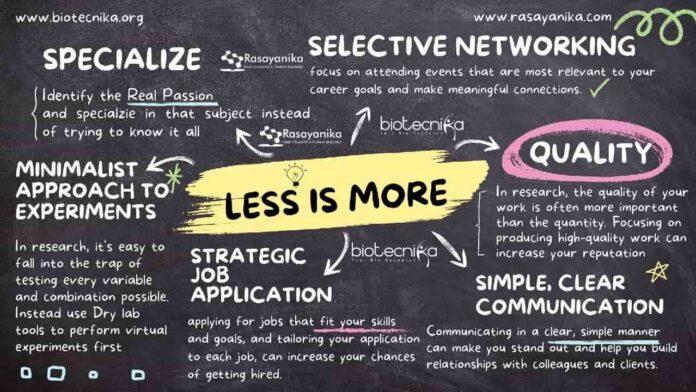Streamline Your Research – Less Is More
In a world that often values quantity over quality, it can be difficult to remember that sometimes less is more. This is particularly true when it comes to research. As a researcher, you may feel pressure to know it all, to test every variable, and to attend every conference. However, taking a minimalist approach to your research can be incredibly beneficial in the long run. In this article, we’ll explore five strategies for streamlining your research and achieving more meaningful results.
Specialize
The first step in streamlining your research is to identify your real passion and specialize in that subject. It’s easy to feel like you need to know everything about every topic in your field, but this is simply not feasible. Instead, focus on what you truly love and become an expert in that area. By specializing, you can become more efficient in your research and produce higher-quality work.
Quality
Speaking of quality, it’s important to remember that quality is often more important than quantity when it comes to research. Producing a large quantity of mediocre work will not do much for your reputation. Instead, focus on producing high-quality work that will
have a lasting impact in your field. This may mean spending more time on each project, but the results will be worth it.Minimalist Approach to Experiments
It’s easy to fall into the trap of testing every variable and combination possible when conducting experiments. However, this approach can be time-consuming and often leads to inconclusive results. Instead, consider using dry lab tools to perform virtual experiments first. This can help you identify the most promising variables to test in the lab, saving you time and resources in the long run.
Selective Networking
Networking is an important part of any career, but it’s important to be strategic about it. Instead of attending every conference and event, focus on those that are most relevant to your career goals. This will allow you to make more meaningful connections with colleagues and potential collaborators. Additionally, don’t be afraid to reach out to people directly if you think they may be able to offer valuable insights or connections.
Simple, Clear Communication
Finally, it’s important to remember that simple, clear communication can make all the difference in your research. Whether you’re presenting your work to colleagues or communicating with clients, it’s important to be able to explain complex ideas in a way that is easy to understand. This can help you stand out and build stronger relationships with those around you.
If you’re looking to take your research career to the next level, it’s important to be strategic about your job applications. Instead of applying for every job that comes your way, focus on those that fit your skills and goals. Additionally, make sure to tailor your applications to each job. This may mean spending more time on each application, but the results will be worth it if you end up with a job that truly fits your needs.
In conclusion, taking a minimalist approach to your research can be incredibly beneficial in the long run. By specializing, focusing on quality over quantity, using a minimalist approach to experiments, being selective about networking, communicating clearly, and being strategic about job applications, you can achieve more meaningful results in your research career. Remember, sometimes less is more.



































